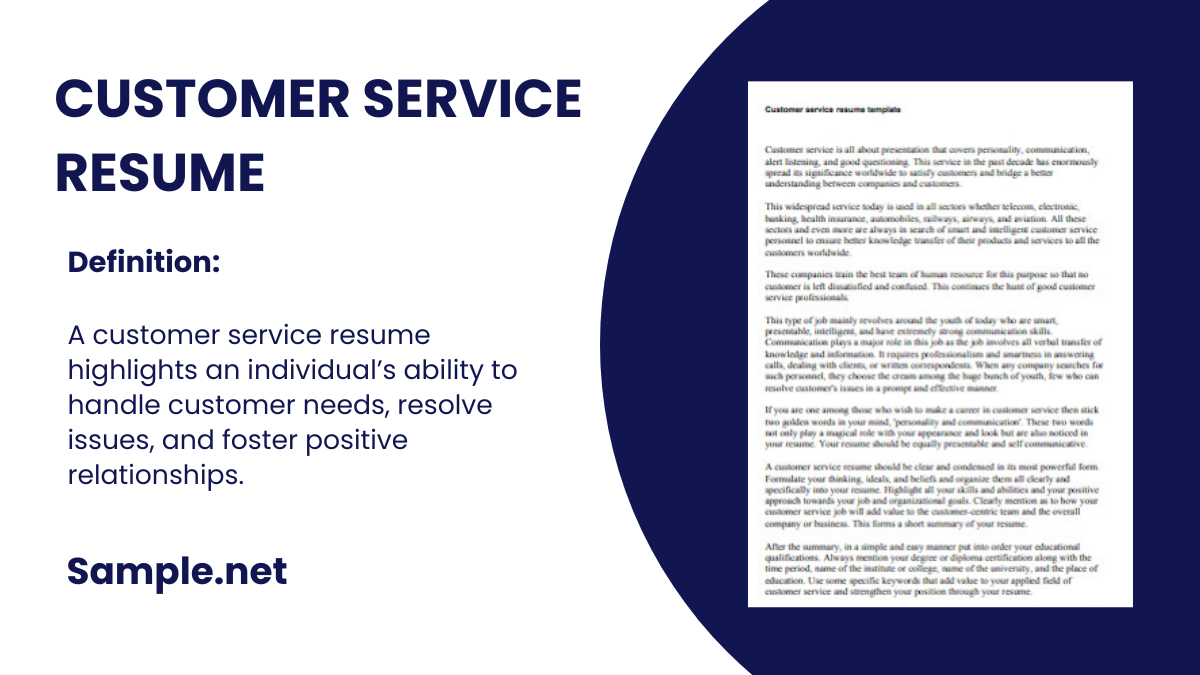A customer service resume highlights an individual’s ability to handle customer needs, resolve issues, and foster positive relationships. It should showcase key skills such as communication, problem-solving, and adaptability…
continue reading
10+ First Job Resume
-
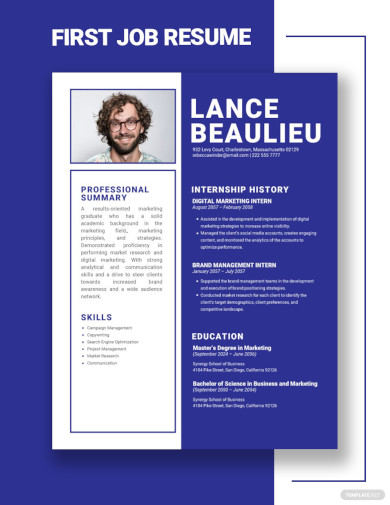
First Job Resume
download now -
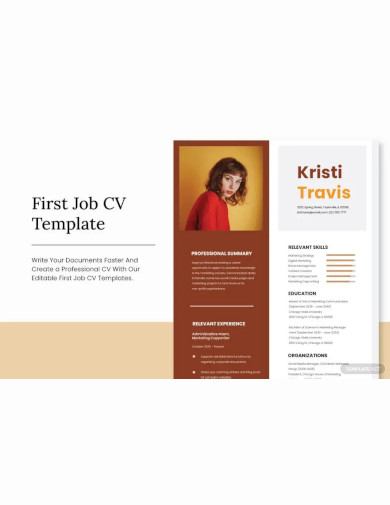
First Job Sample Resume CV
download now -
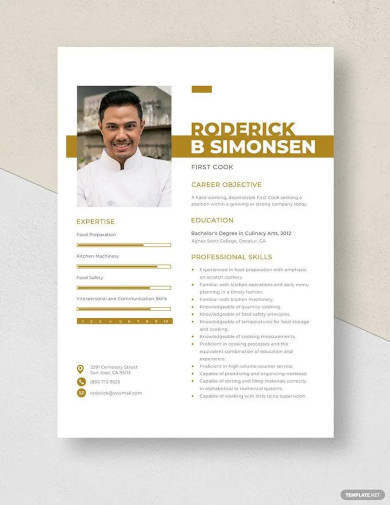
First Cook Resume for Job
download now -
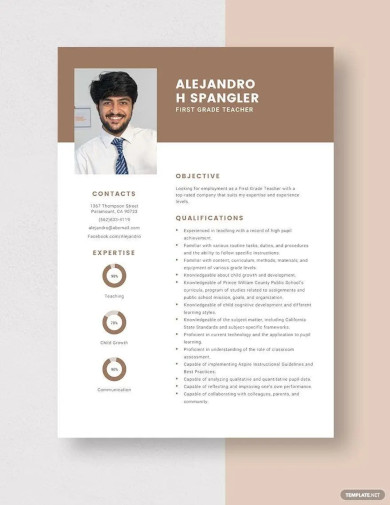
First Grade Teacher Resume for Job
download now -
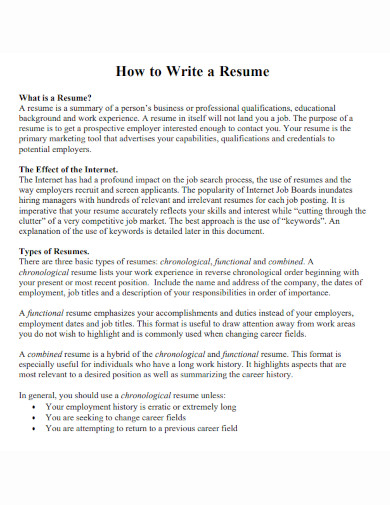
Fiirst Job Format
download now -
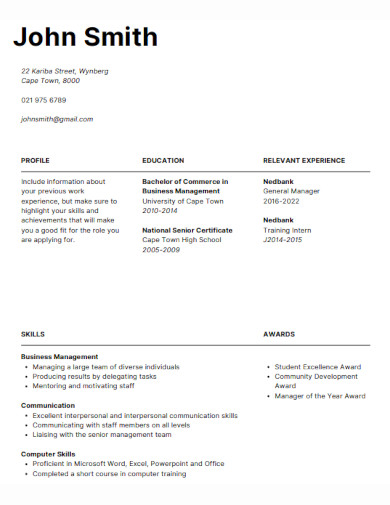
Sample First Job Resume
download now -
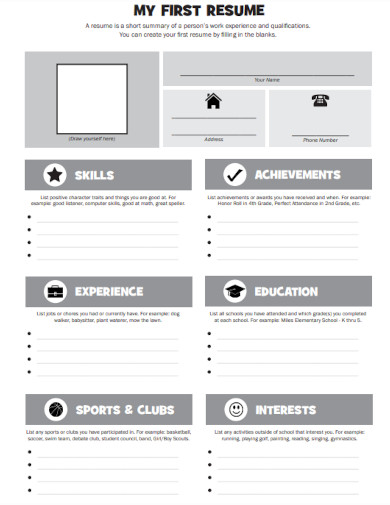
First Job Resume Format
download now -
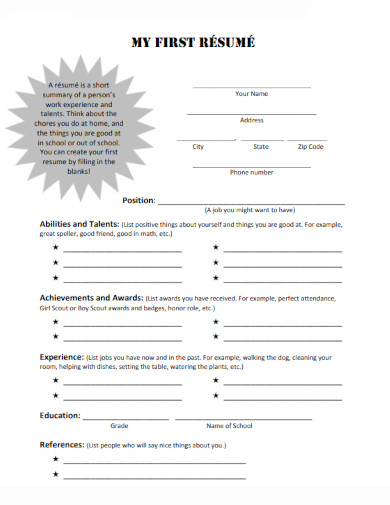
First Resume for School Job
download now -
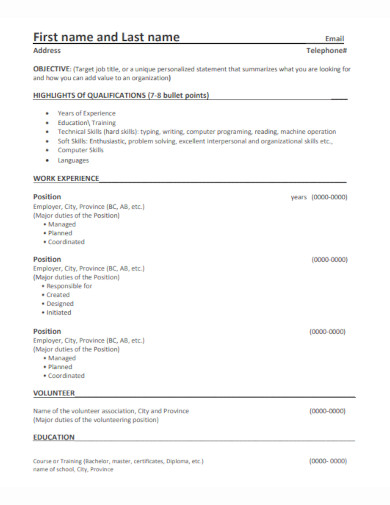
First Job Resume Example
download now -
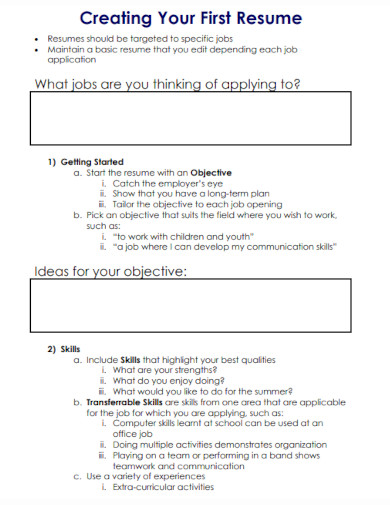
Creating First Job Resume
download now -
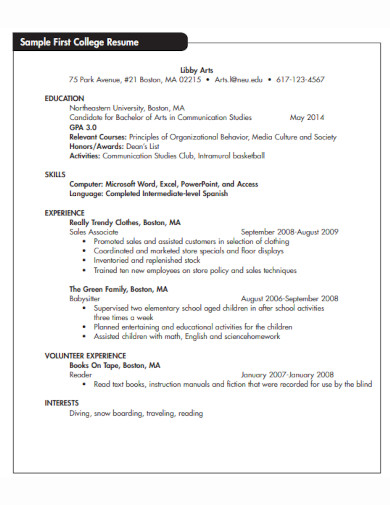
First Job Resume for College
download now
What Is a Resume?
A resume is a formal document that demonstrates a candidate’s career history and abilities. In most cases, it is created to assist a candidate in obtaining a new position. Traditional resumes include sections for a professional summary, work history, and education. It functions as your job search marketing document. A resume aims to introduce yourself to prospective employers, highlight your qualifications, and gain an interview. The purpose of a resume is to present your experience, education, and talents in a standard format that is straightforward for recruiters to read.
Benefits of a Resume
Understanding the typical applications of a resume can help you decide whether or not to compose one. A resume’s primary purpose is to summarize your qualifications for jobs, scholarships, and other opportunities. The reader can scan your application to determine if you are a competitive candidate. Creating a solid resume requires effort and time, but the investment is worthwhile. Here are four benefits associated with a well-written resume.
Tips to Get a Job
In the past decade, a technological surge has significantly impacted the economy, including the most significant growth and adoption of internet use since the late 1990s. As a result, the varieties of available jobs have changed, as have our methods of searching for them in the digital age. Many people use Google and other job sites to find employment openings and for job search advice in the present day. There are many methods to obtain employment. Approaches vary based on the type of position sought, the industry, and the level of competition. Some individuals may find networking and personal connections effective in their job search, but most rely on the traditional approach of applying for jobs and attending interviews. These strategies will help you obtain clarity and confidence as you begin your journey.
1. Consider Your Professional Aspirations
Evaluating your career goals and aspirations can be a more satisfying and fruitful method to begin a job search than applying for any job for which you’re qualified. Considering what makes you come alive can help you target specific roles and vocations in your job search. Next, consider the types of industries and positions in which you have experience or are interested. For instance, if you’re interested in the food and beverage industry, conduct as much research as possible. Have you considered a vocation in information technology, data analysis, marketing campaign, or user experience design?
2. Research Prospective Industries and Occupations
You have a marketing degree; are you interested in pursuing a career in marketing? If so, do you wish to work for an agency, a corporation, or a nonprofit? Which form of marketing do you want to specialize in, such as social media marketing contract, digital, or content marketing? Deepen your search to comprehend the various roles you could perform within a field or industry. Consider remote jobs, jobs that allow you to travel, and jobs better suited for introverts if you’re thinking more about your lifestyle.
3. Identify Your Transferable Abilities
Once you understand your career plans and the types of positions you’re interested in, consider how your experiences can be applied to these positions. Identify your transferable skills, such as the technical and workplace skills you’ve acquired personally and professionally. If you are looking for your first job, you may have transferable skills from extracurricular activities, volunteer work, or daily life (such as caring for children). You can leverage previous work experiences for technical skills such as data analytics or data entry and workplace skills such as leadership, creativity, and critical thinking if you are changing jobs or careers.
4. Build Your Social Media Presence
Now, more than ever, people are using LinkedIn to obtain jobs. LinkedIn hires eight individuals every minute. Approximately 87 percent of recruiters use it during the recruiting process, particularly when vetting candidates. Your LinkedIn profile should reflect your most recent resume and include links to your initiatives, videos, and other content. A professional, approachable profile picture assists recruiters in putting a face to a name, while a bulleted list of accomplishments containing keywords can enhance your credibility.
5. Conduct Informational Interviews
It can be difficult to break into a new industry or field, mainly if you are unsure if that is the right career. This is the purpose of informational interviews. This interview can be used to gain insight into a prospective field or job role. If you maintain contact with your interviewee, informational interviews develop relationships, provide interviewing practice, and can lead to future opportunities.
How to Write Your First Resume
When applying for your first job, preparing a resume highlighting your relevant skills, training, and education is essential. You can demonstrate why you are a strong candidate for the position by accentuating your pertinent qualifications. Knowing how to create a job resume and what information to include can assist you in advancing in the recruiting process and landing your first job. Follow these methods to compose your first resume:
1. Research Keywords
It is beneficial to research keywords in the job description to align your resume with the position for which you are applying. Numerous employers utilize applicant tracking system (ATS) software to assess and sort resumes based on keyword searches. Including the keywords from the job description in your resume may pass the ATS software, increasing the likelihood that an employer will review your application. Review the job descriptions for positions that pique your interest and make a list of the keywords and phrases that appear frequently. Frequently, you can locate keywords in sections such as “key qualifications” or “job responsibilities.” Underline or jot down these keywords to ensure that you include them in your resume.
2. Choose a Resume Format
Choose a resume format that highlights your education and talents when applying for your first job. Employers can swiftly assess your qualifications if you use a standard resume format. Provide your contact information at the top of your resume so potential employers can quickly identify your resume. Indicate your first and last name in a prominent font. Enclose your phone number, email address, and location, including the city and state, below your name. Use a professional email address, such as your initials or a combination of your first and last name.
3. Create a Professional Overview
A professional summary outlines your pertinent talents, education, and experience for a particular position. Typically, you include two or three sentences at the top of your resume to attract the attention of employers rapidly. In your summary, emphasize your relevant talents, education, and experience. It is helpful to describe your accomplishments to demonstrate your value to employers. Also, on a resume for first employment, the education section may be more critical to the employer than the experience section. Include your highest degree or diploma and the name of your institution or college in this section. Specify your date of graduation if it occurred within the past three years. Please provide your anticipated graduation date if you are currently enrolled in school.
4. List Relevant Experience
Even though you’re applying for your first job, you may have other experience that you can include on your resume to demonstrate your qualifications to employers. You can describe volunteer work, internships, initiatives, and extracurricular activities in your experience section. Consider the relevance of your experience to the position for which you are applying. When describing your experience, include your title and dates of employment. Include the organization, association, or activity’s name. Use concise points to describe your responsibilities, accomplishments, and applicable skills. In addition, include a section in your resume highlighting your relevant skills and abilities for the position. Include between six and ten talents on your resume. Include both technical and interpersonal abilities. Soft skills describe your personality qualities, such as leadership, whereas hard skills denote your technical competencies, such as proficiency with specific software. Review the job description again to ensure you’ve included the skills the employer seeks in candidates.
FAQs
What is the optimal resume length for a first job?
For your first employment application, aim for a one-page resume. This length ensures that employers can swiftly review your resume. If you have multiple non-work experiences, only include those most relevant to the job on your resume. You may also make minor modifications to shorten your resume to one page. For instance, you can adjust the margins to 1.25 or 1.5 inches or increase the font size marginally.
Can I use a resume template for my first job?
Yes, it is beneficial to use a template for your first resume. Find professional resume templates by searching online or using a word processor. Choose a precise and professional template without graphics or images to ensure your resume can pass an employer’s ATS software. You can also browse for sample resumes for a particular position or industry to assist you in selecting the proper format.
Is it helpful to write a cover letter for a first job?
When applying for your first job, a cover letter can help you describe your qualifications in greater detail, though it is only sometimes required. A well-written cover letter can convey your enthusiasm for the job and your professionalism as an entry-level candidate. Describe in your cover letter how your non-work experiences, such as volunteer jobs or extracurricular activities, have helped you develop skills applicable to the position for which you are applying. To demonstrate your value to prospective employers, emphasize your skills that align with the organization’s goals. Similar to your resume, limit the length of your cover letter to one page.
Finding the appropriate first position can be a crucial step. It won’t necessarily determine the remainder of your career, but it could lead to fantastic opportunities. Try making the best decisions because you never know what will happen next. Because you want to earn money, settling for second best is not an option. If you aim lofty, you never know what you might accomplish.

